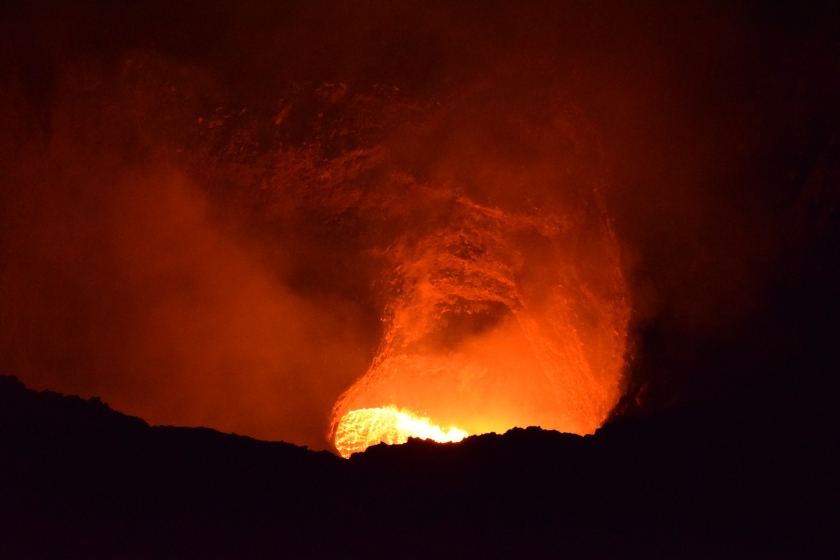
Granada is a colonial city on the shores of Lake Nicaragua. Upon arrival during late afternoon our tour guide gave us a few warnings:
- Don’t walk down certain streets after dark
- Don’t use ATM’s after dark even when in a group
- Stick together as a group
We were also told not to give food or money to beggars or even child beggars. There is a huge drug problem in Granada which fuels the crime issues.
We didn’t see any but apparently it is common to see children roaming the streets with obvious drug and alcohol problems in Granada. The atmosphere away from the main square was decidedly shady and this was the only place in Central America where we didn’t feel particularly safe. However, just to be clear, this was only a night time issue. The streets felt fine during the day.
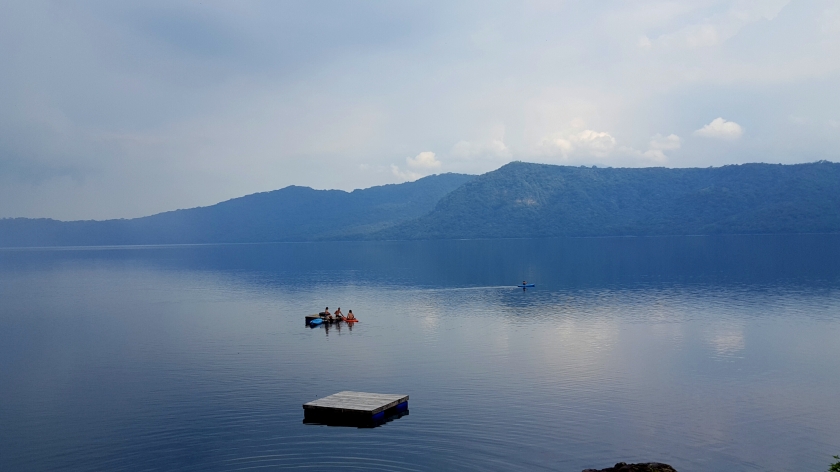
Marial, the tour leader of our Intrepid group of 12 took us to the main square and the ‘eat street’ of Granada which she said was fine and relatively safe even during the evening. We found a pleasant outside restaurant however had both children and dogs hovering around waiting for food scraps. Many of the restaurants, ours included, gather the food leftovers and place them on a table so the local kids can help themselves.
In terms of tourism Guatemala seemed to be a little more advanced than Nicaragua. Guatemala is working hard to attract tourists in order to boost their economy and has armed guards in bank and shop doorways and community police and tourism offers visible on most streets. Other than at ATM’s we saw little of this in Nicaragua.
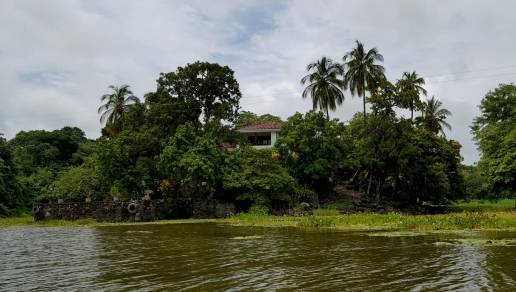
We had two nights and one full day in Granada. During our full day the group of 12 Intrepid travellers participated in a tour which included a boat trip on Lake Nicaragua, a bus tour around the city, a relaxing afternoon by the lake and a fantastic view of the bubbling liquid lava of the Nindiri volcano crater!
During our boat trip on Lake Nicaragua we noticed many homes of rich people where for around half a million dollars you can buy one of the 365 islands and build yourself a luxury retreat.
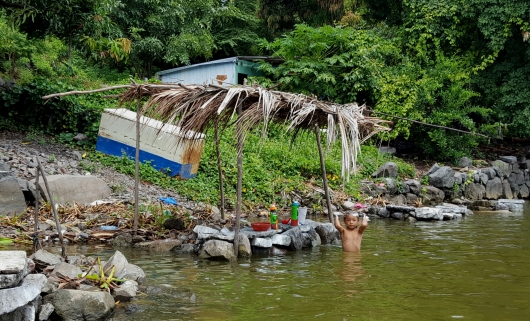
In total contrast, the poor live side by side with the rich and we witnessed people doing their washing in the lake. Above is a photograph of a young girl who was washing her hair in the lake. She rubbed the shampoo in then in order to rinse it off she dived into the water with the grace of a small mermaid.
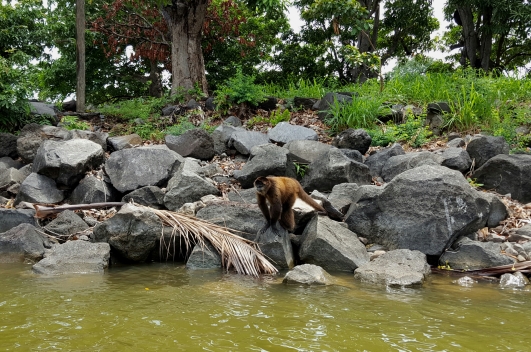
One of the islands is a monkey sanctuary with five spider monkeys. The island was set up by a Nicaraguan vet as a sanctuary for rescued monkeys.
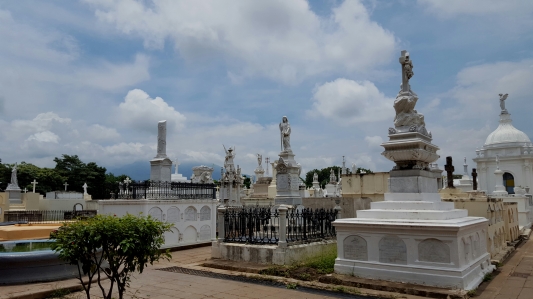
We had a short visit to the Granada cemetery which contains the elaborate tombs of six Nicaraguan presidents.
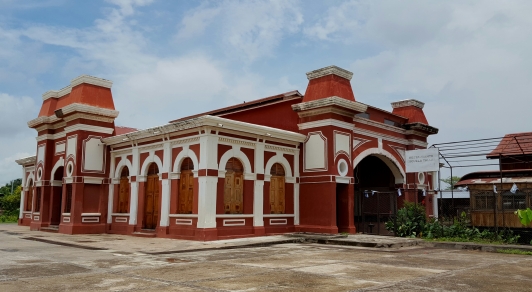
There have been no trains in Nicaragua since 2006 however the original station building still remains in Granada.
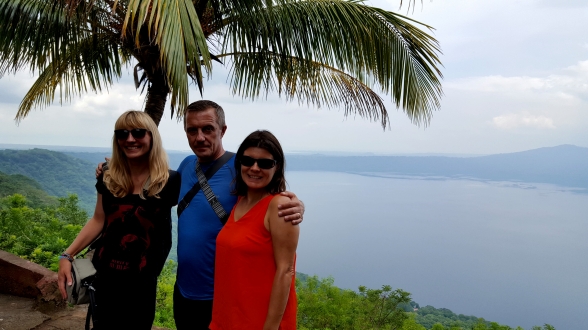
We spent the afternoon at the Laguna Beach Club where some of the group participated in paddle boarding and kayaking. Our guide provided 5 gallons… yes 5 gallons of some kind of tequila and fruit juice punch! This was between 11 of us… So we had a good afternoon!!
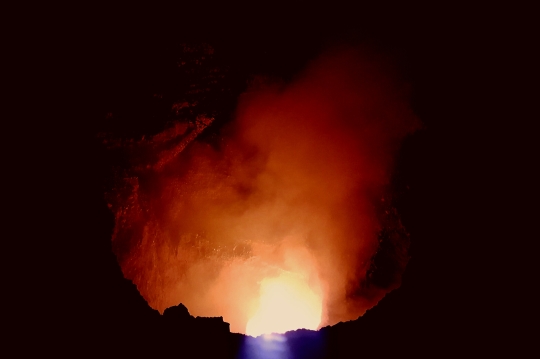
Now for the absolute highlight of the day or even in fact one of the top highlights of our world tour of 2016… Above is the view we had as we peered down into the Nindiri volcano crater bubbling with liquid lava! This was one moment where everyone in our Intrepid group felt completely in awe… to peer into a crater and watch the swirling mass of liquid lava was an incredible moment and surpasses the crater view we had at the Hawaii Volcano National Park in January this year where we felt lucky to see the crater from a distance.
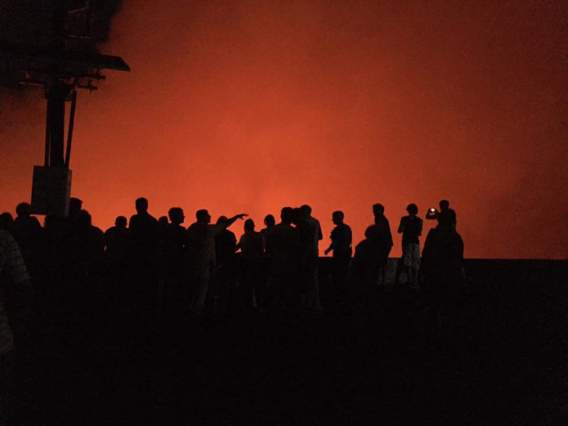
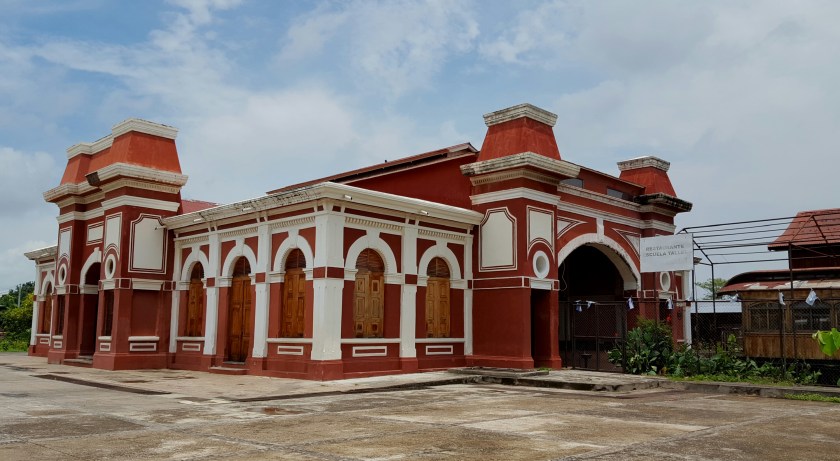
Not sure what Granada you were visiting. I have spent 6 months in Granada over the span of 3 years and am going back this year for 2 months. I have never felt unsafe in Granada. There is no obvious drug problem except for the glue sniffers who are harmless. The reason you do not feed the beggars is because it rewards and encourages this behavior so they bother the tourists and do not learn how to take care of themselves. I have NEVER seen “Many of the restaurants, ours included, gather the food leftovers and place them on a table so the local kids can help themselves.” as even the restaurant shoos the beggars away from the customers. I think your tour guide gave you some improper impressions of Granada. Like any Central American country it is best to be home by 8:00 o’clock, not because of violence per se, but more for being seen as opportunity. Nicaragua is a poor country with the most kind and humble people, however there are those who would like to mug you if they have the opportunity. I personally feel safer in Granada than I do in Chicago, NY, and Boston. The same common sense I apply in those cities I apply in Granada. And in Granada I do not have to worry about guns or terrorist acts.
LikeLike
Thank you for taking the time to comment on our blog and its helpful to hear this from the perspective of someone who has spent 6 months there which is of course different from the first impressions of the 2 day visit we had.
To pick up on the points you raise:
1. We had two guides; a Guatemalan who has lead this trip many times and a local Nicaraguan who has lived in Granada all his life. Our Guatemalan guide described occasions where she had come across drug and alcohol addicted children and stated this was not uncommon. Our Nicaraguan guide showed us which were safe streets and which were not and reinforced the safety points. As you mention certain streets are dark and not safe at night.
2. The restaurant we visited on the first night had a separate table where all of the leftovers were put for the children who were hanging around in the street. Maybe this was so they didn’t bother tourists.
3. We agree that Nicaraguan’s are humble, kind and warm people.
4. We also agree that we’ve generally felt safe in Central America and statistically there is far more chance of being attacked or murdered in many US cities. As someone who works in London, the threat from terrorists is always there.
We strive to provide accurate and honest opinions based on our own experiences however brief they might be. However it is important that these opinions are clarified at times and so are grateful that you have commented on them.
LikeLike
Chris and Laura, I wouldn’t worry too much about your review of Granada. I have lived here since 2004 and I can tell you from experience that the expats in all areas of Nicaragua protect and defend their cities and towns from bad press. Nicaragua isn’t paradise, and it does have its problems, which shouldn’t be ignored in visitors’ blogs. It only make us more aware of first impressions and we can work together to solve the problems that we may not see as residents. 🙂
LikeLike
Thank you! I can understand that expats would wish to see their location being presented in a positive light. As mentioned we have felt safe whilst travelling through Central America both on our own and as part of a tour group despite reading reports about bandit attacks and murders before we got here! I guess its a case of being aware and being sensible as one would be in any town or city especially after dark.
LikeLiked by 1 person
I lived in Granada for about 6 years and you are right. It’s not as safe as some would like to pretend. While living in Granada I had guests taxi-kidnapped 3 times. An attractive well-dressed Nica offers to share a taxi with you, after chatting you up and finding out where you are headed. S/he says they are going to the same place and why not share a taxi since taxis in Nicaragua are almost like mini-buses: they stop for more passengers until they are full or arrive where they’re going.
Then they take you somewhere unmarked and remote and throw you out. In one case the female tourist was groped, had a gun held to her face with the holder yelling BANG! every so often. They terrorized her all the way from Granada to Leon, in the daytime. They took everything she had, including her hotel key, passport and of course all her money and possessions. The only way she got back to my house was because an old woman saw the kidnappers throw her from the taxi and offered to lend her bus fare to return to Granada.
On another occasion one guest who spoke fluent Spanish talked them into giving him back enough money to get back to my house, where he arrived shaken and disoriented after being threatened with a machete.
I had my passport and wallet stolen by a woman, in cahoots with the taxi driver, who picked her and her toddler up after I was already in the taxi. The woman had her toddler spill a soda all over me and then was all over me wiping it off. Then they got out. When I got where I was going my wallet and passport had mysteriously disappeared. Pickpockets are highly skilled in bumping into you and taking whatever is in your pockets.
Glue-sniffing homeless boys hang around all touristy areas. The serious drug exchange takes place out by the cemetery. A taxi driver friend told me he even saw muggers take a man’s clothes and shoes there one night, leaving him in his underwear.
A Nica acquaintance bragged about how he offered to supply marijuana to a tourist, who took him up on it, then the Nica told his policeman friend where he could make the bust. The cop took the bribe offered and let him go, taking the dope as well.
Right there on the “food street”, the Alcazada, a US friend got her leg slashed by a broken bottle, being used in a drunken brawl in front of one of the famous restaurants. And her companion had her bag stolen by a sneak thief who snatched it right off her shoulder. Other thieves snatch bags and cameras while zooming past on their motorcycles. I saw one woman being dragged and kicked until she let go of her bag. A resident had his bicycle stolen while standing in line to pay for something at an outdoor window. He was only about 6 ft. from it when the thief got on and rode it away.
My housekeeper had a long scar on her arm, a machete slash a rooftop burglar gave her when he jumped down from the roof intending to steal things to sell.
Several years ago a real estate agent with real estate escrow money was accused of being a drug dealer. The 20-something judge that sentenced him to prison had no idea what an escrow was and couldn’t imagine large amounts of money being meant for anything but drugs. That “judge” had no legal training whatsoever, just someone with connections to appoint him. The real estate agent spent a very long time in a horrible jail, lost his health and his business. The Embassy can’t/won’t help you if you are accused of a crime, whether it’s valid or not.
Of course, most of this COULD happen in the US or other countries, but I had never had anything like it happen to me in the US or the several other countries I have lived in.
I don’t intend to discourage anyone who wants to visit Nicaragua. I encourage you to do it. But as this blogger says, go in a group and be sure it’s with a known tour provider. And be extra careful after dark. Much of the “warm and friendly” you encounter will be fake, designed to inspire confidence so you can be ripped off.
LikeLiked by 1 person
Thank you for your detailed comment and the examples you give which are truly shocking! This totally underpins the advice given to us by our guides and the importance of taking it seriously. I hope this raises awareness for future visitors to Granada and lets hope the situation improves as if you take away the crime, Granada is a beautiful city.
LikeLike